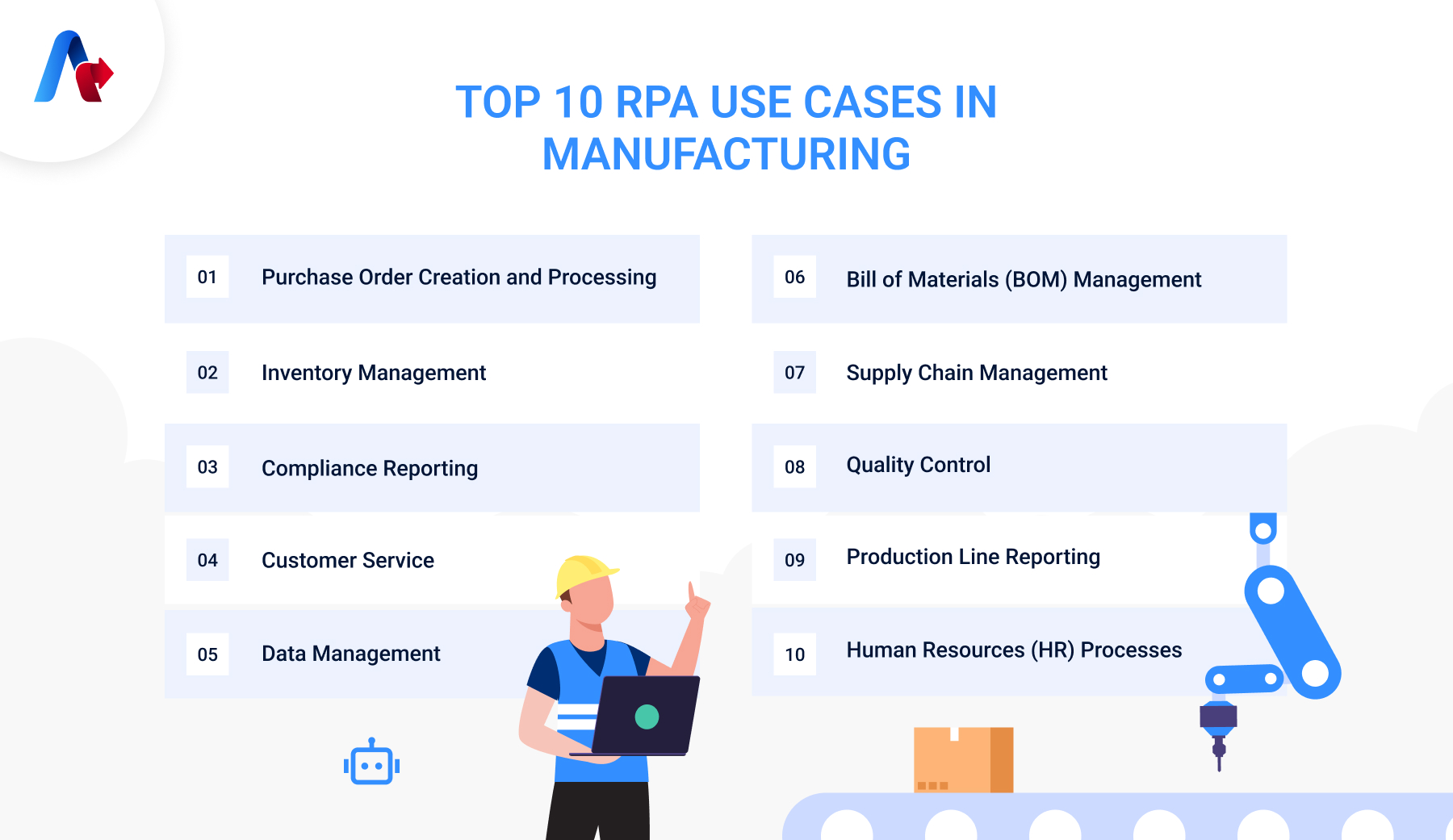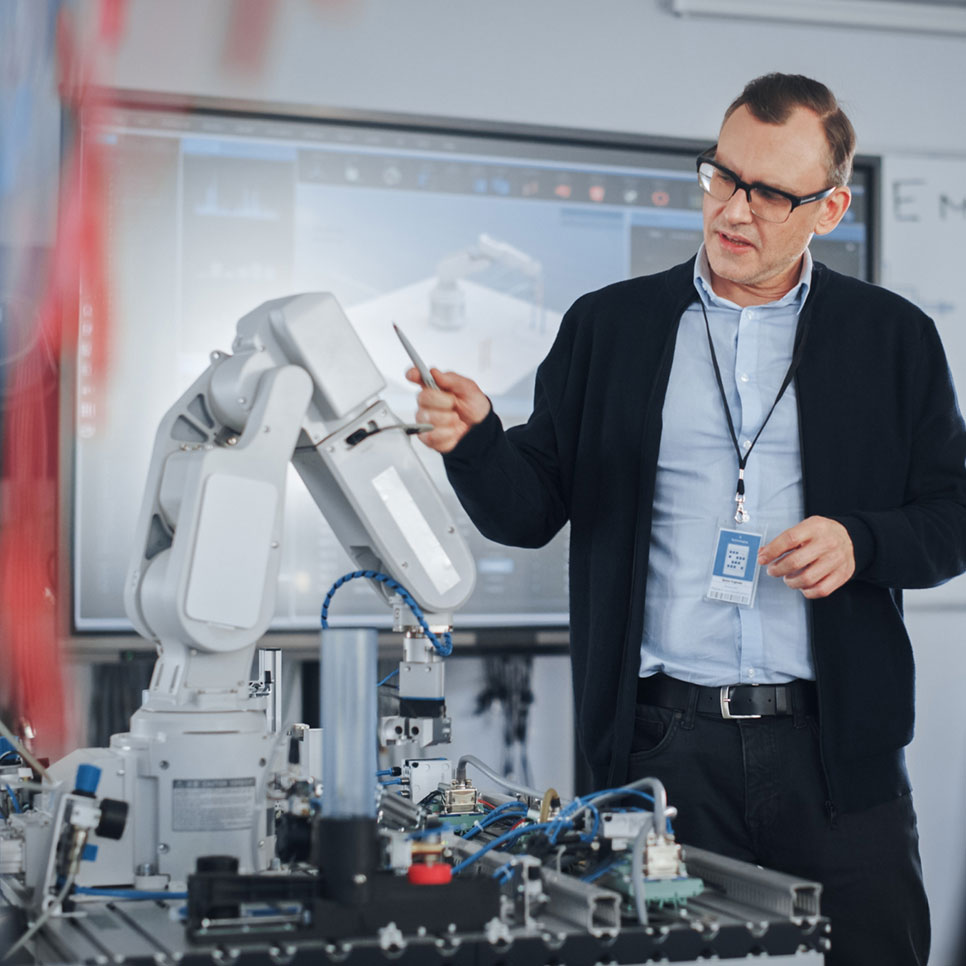RPA in Manufacturing
BLOG
Robots have been used in the manufacturing industry for many decades, with the main objective of speeding up day-to-day operations. Manufacturing industry leaders today are looking for ways to solve pressing challenges like maximized productivity and budgetary constraints.
Robotic Process Automation (RPA) has emerged as a transformative technology across various industries, and manufacturing is no exception. RPA refers to the use of software bots to automate repetitive, rule-based tasks that were traditionally performed by humans. Unlike physical robots that operate on assembly lines, RPA bots work digitally, interacting with software applications and systems to execute processes more efficiently and accurately.
According to the Deloitte manufacturing outlook survey 2023, studied the plan to focus on a range of technologies to increase operational efficiencies over the next 12 months found RPA at the top priority with 62%, amongst various other in-demand technologies like cloud computing and data analytics.
The stats indicate companies' increased focus on advanced manufacturing technologies, with RPA in manufacturing at the highest. In this blog, we will explore the top benefits and see some real-world use cases!
What is Robotic Process Automation in Manufacturing, and How Does It Work?
Manufacturing automation can streamline operations by automating tasks like data entry, order processing, inventory management, and compliance reporting. These bots can operate 24/7, significantly reducing the time and effort required to complete these processes while minimizing errors.

The way RPA in manufacturing works is relatively straightforward. Bots are programmed to mimic human interactions with software applications. For instance, a bot can log into an ERP (Enterprise Resource Planning) system, extract data, perform calculations, and input the results into another system. RPA is non-invasive, meaning it can work with existing IT infrastructure without requiring major changes, making it a flexible and scalable solution for manufacturing companies.
Benefits of RPA in the Manufacturing Industry
The key to fully leveraging benefits from RPA in the manufacturing industry is to automate the rule-based repetitive tasks and minimize the need for human involvement. Here’s how manufacturing automation leads to excellence:
- Increased Efficiency and Productivity: RPA bots can perform tasks faster and more accurately than humans, leading to significant improvements in operational efficiency. This allows human workers to focus on more complex and strategic activities, thereby enhancing overall productivity.
For Example: Our client an International Manufacturing Company saved over 90 monthly man hours and achieved a 96% reduction in processing time. The process that once took three hours per day now required only 30 minutes for an entire month of transaction data. This automation eliminated human error, reduced backlogs, improved vendor relationships, and enhanced employee job satisfaction by alleviating manual workload. Read the full story on how robotic process automation enhanced operational efficiency in manufacturing.
- Improved Accuracy and Consistency: RPA bots follow predefined rules and workflows with precision, ensuring that tasks are completed consistently and without errors. This is particularly valuable in manufacturing, where even small errors can have significant consequences.
- Cost Savings: By automating routine tasks, manufacturers can reduce labor costs associated with these activities. Additionally, RPA minimizes errors, which can lead to cost savings by reducing the need for rework and minimizing waste.
For Example: A leading electronic component distributor struggled with manual inventory management, leading to stockouts, overstocking, and missed sales. To address these challenges, they implemented a solution combining automated inventory tracking, real-time data visualization, predictive maintenance, unified CRM, and streamlined sales order processing. This comprehensive approach significantly improved inventory management and lowered overall inventory costs by 20%. Read full story of their manufacturing cost savings.
- Enhanced Compliance: Manufacturing companies must adhere to strict regulatory requirements. RPA in manufacturing helps ensure compliance by accurately recording and reporting data, reducing the risk of non-compliance and associated penalties.
- Scalability: Robotic Process Automation solutions can be easily scaled to meet the changing needs of a manufacturing operation. As the business grows, additional bots can be deployed to handle increased workloads without the need for proportional increases in staffing.
For Example: A prominent chemical manufacturing company committed to using technology to promote innovative and sustainable agricultural practices. They embarked on a digital transformation to improve procurement operations and identified $20M in working capital leaks. Read the full success story of their automated manufacturing transformation.
- Enhanced Compliance: Manufacturing companies must adhere to strict regulatory requirements. RPA in manufacturing helps ensure compliance by accurately recording and reporting data, reducing the risk of non-compliance and associated penalties.
- Better Decision-Making: With RPA, data from various processes can be collected and analyzed more efficiently, providing manufacturing leaders with valuable insights to make informed decisions.
Top 10 RPA Use Cases in Manufacturing

Automation in manufacturing reduces human dependency by simplifying various tasks related to inventory management, compliance, finance, HR, customer service and more. Manufacturing automation leads to increased productivity and growth with efficient resource use.
Let’s have a look at some of the key RPA use cases in manufacturing!
1. Purchase Order Creation and Processing
A lot of time is spent in order management starting for order creation to order fulfilment. RPA uses predefines workflows to automate the whole process quickly ad seamlessly. Here’s how:
- Automation of Order Entry: RPA can handle the end-to-end process of order entry, from capturing order details from emails or other sources to inputting them into ERP systems. This eliminates the need for manual data entry, reduces errors, and speeds up order fulfillment.
- Order Confirmation and Tracking: Bots can automatically send order confirmations to customers and update order tracking information, ensuring that customers receive timely updates on their orders.
Click Here to Read Purchase Order Automation Case Study!
2. Inventory Management
An efficient inventory management system can help businesses save millions of dollars by addressing the issue of overstocking and understocking. Here’s how automation optimises this process:
- Real-Time Inventory Monitoring: RPA bots can continuously monitor inventory levels across multiple locations, providing real-time updates. When stock levels fall below a certain threshold, the bots can trigger reorder processes automatically.
- Inventory Reconciliation: Bots can compare inventory records across different systems, identify discrepancies, and make necessary adjustments, ensuring that inventory data is always accurate.
3. Bill of Materials (BOM) Management
Bills of Materials is a detailed handbook containing crucial information such as raw materials requirement, components or sub- subcomponents required, details of assembling and packaging. RPA ensures smooth production by:
- Automating BOM Creation: RPA can automate the creation of Bills of Materials by extracting data from design documents and populating BOM templates. This ensures that BOMs are accurate and up-to-date, reducing the risk of errors in production.
- BOM Updates: When product designs change, RPA can automatically update the BOMs in the system, ensuring that production teams always have the latest information.
4. Supply Chain Management
Manufacturers may experience fluctuations in their supply chain as a result of worldwide geopolitical instability. Automation technologies, such as Robotic Process Automation (RPA), assist businesses in gaining maximum control over scattered global supply chains. Here’s how:
- Supplier Communication: RPA can automate routine communications with suppliers, such as sending purchase orders, confirming order receipts, and following up on deliveries. This streamlines the supply chain process and reduces the workload on procurement teams.
- Invoice Processing: Bots can handle the entire process of invoice processing, from receipt to payment, ensuring that invoices are processed accurately and on time.
Click Here to Read Invoice Processing Automation Case Study!
5. Compliance Reporting
Adhering to strict compliance can be a daunting process. Manufacturing automation facilitates compliance in real time with its advance features making the whole process seamless. Here’s how:
- Automated Report Generation: Manufacturing companies are required to comply with various regulatory standards, which often involve generating detailed reports. RPA automates the collection of data and the generation of compliance reports, ensuring that all regulatory requirements are met.
- Audit Trail Maintenance: Bots can maintain an accurate and detailed audit trail of all compliance-related activities, making it easier to track and report compliance during audits.
6. Quality Control
RPA in manufacturing covers up the places where most human errors are possible by using intelligence systems. Here’s what more it can do:
- Data Collection and Analysis: It can automate the collection of quality control data from various production lines and systems. Bots can then analyze this data to identify patterns, trends, or anomalies that may indicate potential quality issues.
- Automated Reporting: Bots can generate quality control reports and distribute them to relevant stakeholders, ensuring that any issues are promptly addressed.
7. Customer Service
According to a Zendesk study, in the manufacturing sector, 81% of customers say that a good customer experience encourages another purchase.
Automation keeps customers and vendors happy with timely query resolution 24/7. Here’s how:
- Order Status Inquiries: RPA bots can handle customer inquiries related to order status, shipment tracking, and returns processing. By automating these routine tasks, companies can improve response times and customer satisfaction.
- Automated Complaint Resolution: Bots can automatically categorize and route customer complaints to the appropriate departments, ensuring that issues are resolved quickly and efficiently.
8. Production Line Reporting
- Real-Time Performance Monitoring: RPA can automate the process of collecting and reporting production line performance data, providing managers with real-time performance monitoring insights into production efficiency, downtime, and other key metrics.
- Automated Alerts: If a production line's performance falls below a certain threshold, bots can automatically send alerts to supervisors, enabling them to take corrective action promptly.
For Example: At the forefront of global manufacturing, the client operates units and facilities spanning diverse countries, necessitating a strategic emphasis on efficient cross-border communication and streamlined ticket-handling processes.
The comprehensive solution strategically combined the NLP capabilities of GPT with the powerful automation features of UiPath resulting in substantial monthly time savings of 230+ hrs and a high STP rate of 85%.
Click Here to Read RPA in Manufacturing Solving Cross-Border Communication Case Study!
9. Data Management
According to statistics, engineers in the industrial sector spend 37% of their time manually gathering and interpreting data. However, production data necessitates ongoing study and updating. Bots with RPA can automate:
- Legacy System Integration: RPA can automate the migration of data from legacy systems to new platforms, ensuring that data is transferred accurately and consistently without disrupting operations.
- Data Cleanup: During the migration process, bots can also clean up and standardize data, eliminating duplicates and correcting errors, which improves the overall quality of the data.
10. Human Resources (HR) Processes
Manufacturing thrives on thousands of back-office tasks and documentation. RPA can automate it all in no time. Here’s how:
- Payroll Processing: RPA can automate payroll processing by extracting employee time and attendance data, calculating wages, and generating pay slips. This reduces the risk of errors and ensures that employees are paid accurately and on time. See Real Impact of Payroll Automation in Manufacturing
- Employee Onboarding: Bots can streamline the onboarding process by automating tasks such as document collection, data entry into HR systems, and the scheduling of training sessions, ensuring a smooth and efficient onboarding experience.
Ready to Revolutionize Your Manufacturing Operations?
Connect with Our Experts TodayEmpowering Manufacturers in Long Run
Manufacturers have increased their digital investment over the past few years and accelerated the adoption of emerging technologies. Manufacturing Automation transitions repetitive labour and fosters innovation transforming manufacturing landscape. Combining RPA with cutting edge technologies like AI and IoT enhances decision-making and optimization. Agility, flexibility, and cooperative workflows are fostered, ensuring adaptability to shifting market needs. As RPA in manufacturing advances, it promises to get better, positioning manufacturing for sustained development and competitiveness in the modern world.


